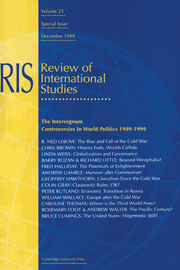Book contents
- Frontmatter
- Contents
- Acknowledgements
- Foreword
- Notes on contributors
- Introduction
- 1 The Rise and Fall of the Cold War in Comparative Perspective
- 2 History Ends, World Collide
- 3 Globalization and National Governance: Antinomies or Interdependence?
- 4 Beyond Westphalia?: Capitalism after the ‘Fall’
- 5 The Potentials of Enlightenment
- 6 Marxism after Communism
- 7 Liberalism Since the Cold War: An Enemy to Itself?
- 8 Clausewitz Rules, OK? The Future is the Past—with GPS
- 9 Mission Impossible? The IMF and the Failure of the Market Transition in Russia
- 10 Europe after the Cold War: Interstate Order or post-Sovereign Regional System?
- 11 Where is the Third World Now?
- 12 Whatever Happened to the Pacific Century?
- 13 Still the American Century
- Index
13 - Still the American Century
Published online by Cambridge University Press: 05 November 2009
- Frontmatter
- Contents
- Acknowledgements
- Foreword
- Notes on contributors
- Introduction
- 1 The Rise and Fall of the Cold War in Comparative Perspective
- 2 History Ends, World Collide
- 3 Globalization and National Governance: Antinomies or Interdependence?
- 4 Beyond Westphalia?: Capitalism after the ‘Fall’
- 5 The Potentials of Enlightenment
- 6 Marxism after Communism
- 7 Liberalism Since the Cold War: An Enemy to Itself?
- 8 Clausewitz Rules, OK? The Future is the Past—with GPS
- 9 Mission Impossible? The IMF and the Failure of the Market Transition in Russia
- 10 Europe after the Cold War: Interstate Order or post-Sovereign Regional System?
- 11 Where is the Third World Now?
- 12 Whatever Happened to the Pacific Century?
- 13 Still the American Century
- Index
Summary
At the inception of the twenty-first century—not to mention the next millennium—books on ‘the American Century’ proliferate monthly, if not daily. We now have The American Century Dictionary, The American Century Thesaurus, and even The American Century Cookbook; perhaps the American Century baseball cap or cologne is not far behind. With one or two exceptions, the authors celebrate the unipolar pre-eminence and comprehensive economic advantage that the United States now enjoys. Surveys of public opinion show that most people agree: the American wave appears to be surging just as the year 2000 beckons. Unemployment and inflation are both at twenty-year lows, sending economists (who say you can't get lows for both at the same time) back to the drawing board. The stock market roars past the magic 10,000 mark, and the monster federal budget deficit of a decade ago miraculously metamorphoses into a surplus that may soon reach upwards of $1 trillion. Meanwhile President William Jefferson Clinton, not long after a humiliating impeachment, is rated in 1999 as the best of all postwar presidents in conducting foreign policy (a dizzying ascent from eighth place in 1994), according to a nationwide poll by the Chicago Council on Foreign Relations. This surprising result might also, of course, bespeak inattention: when asked to name the two or three most important foreign policy issues facing the US, fully 21 per cent of the public couldn't think of one (they answered ‘don't know’), and a mere seven per cent thought foreign policy issues were important to the nation. But who cares, when all is for the best in the best of all possible worlds?
- Type
- Chapter
- Information
- The Interregnum: Controversies in World Politics 1989–1999 , pp. 271 - 300Publisher: Cambridge University PressPrint publication year: 2000



